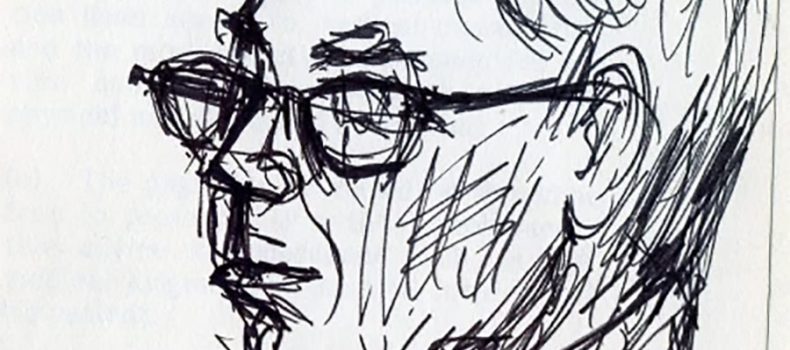“A bayshpil”, sung by Jacob Gorelik
Jacob (Yankev) Gorelik was born in Schedrin (Shchadryn, Scadryn) Belarus, and came to the US in the 1920s. This performance was recorded at a concert in New York City on November 10th, 1990, organized by Center for Traditional Music and Dance, then called the Ethnic Folk Arts Center. This event was part of The Yiddish Folksong Project which had similar aims to the current An-sky Folkore Research Project. Other singers performing that evening were Beyle Schaechter-Gottesman and Paula Teitelbaum. We eventually hope to post some of their performances from that concert as well. Gorelik died in Miami in the late 1990s.

Sketch of Jacob Gorelik by Beyle Schaechter-Gottesman
Jacob Gorelik performed for all the sectors of the Yiddish world – left, center and right – and never mixed politics with art. He had written down the words for the songs he performed in a small notebook which was bursting at the seams after he kept stuffing little notes inside it, so he used rubber bands to keep it together. You can see a clip of him singing with his book in a documentary on Jews in Miami Beach made in the 80s or 90s by Joel Saxe called „The Yiddish Folksingers of Miami.”
The song „A bayshpil‟ (An Example) is a version of „Der alter foter‟ (the old father) by Elyokum Zunser, probably the most famous and popular badkhn of his time (1836-1913). I have scanned the original version of this song in Yiddish as it appears in his collected works, Elyokum Zunzers verk edited by Mordkhe Schaechter, YIVO, NY 1964. p. 242-243, first published in Zunser‘s collection Hamenagin, 1873.
One quick episode from Zunser‘s autobiography which was unforgettable when I read it: his wife fell asleep in a horse and wagon with their baby on her lap in the woods during winter. When she woke up, she realized the baby fell off the wagon and when they went to retrieve it, wolves were in the middle of devouring it.
Zunser‘s songs, in my opinion, aren‘t particularly catchy or melodic, but he was a badkhn/wedding performer who emphasized the ethics of Jewish life, rather than the entertainment value of his work. Gorelik learned this song from his mother in Schedrin and his clear tenor expresses the message beautifully.
A bayshpil ken ikh aykh mentshn gebn,
dem sof fun mir batrakht atsind.
Es iz beser af der velt nit tsu lebn,
eyder onkumen tsu a kind.
An example, i can give you people,
the end of me, please consider.
It is better not to live in this world,
than to depend on your child.
ikh hob ongelebt yorn
mit koved un mit gelt,
gehandlt un geforn,
gefirt gants sheyn mayn velt.
I lived out my years,
in honor and with wealth,
did business and traveled,
and led a beautiful world.
Fardint gor sheyn mayn gildn,
mit kredit, mit erlekhkayt.
gelozt kinder bildn,
zey zoln vern layt.
I earned a pretty penny,
with credit, with honesty.
I gave my children an education,
they should become decent people.
Mayn gvirishaft, mayn gantse kraft.
Tsu mayne kinder ver ikh on;
haynt iz far mir, farshpart di tir
Ikh hob zikh nit vu ahintsuton.
My fortitude, my whole strength,
I lost it all for my children.
Today the door is locked for me.
I don‘t have anywhere to go.
Far kinder hob ikh mayn haldz geshnitn
gevorn gro un oysgedart.
Brider, got zol aykh bahitn,
aza elter vi ikh hob zikh dervart.
For my children, I cut my throat,
became gray and thin.
Brother, may God protect you,
from such elderly years as i had waiting for me.
Ay, ikh hob ertseygn [dialect form of „ertsoygn‟],
mayn kind, mayn bkhor aleyn,
hob ikh tsefoylt di oygn
fun trern, fun geveyn.
O, I raised
my child, my eldest son by myself,
and thereby ruined by eyes,
with tears, with laments.
Rubls iz geshvumen
un kreftn vert men on,
eyder zey bakumen,
in moyl dem ershtn tson,
Rubles were swimming [are spent?],
and one loses one‘s strength,
before they get,
their first tooth in their mouth.
Di pokelekh, di mozelekh,
der tate shtelt zayn lebn ayn in kon.
Haynt traybt men mikh, aroys fun kikh,
ikh hob zikh nit vu ahintsuton.
The pocks, the measles;
the father risks his life.
Today, I am driven out of the kitchen,
I don‘t have anywhere to go.


